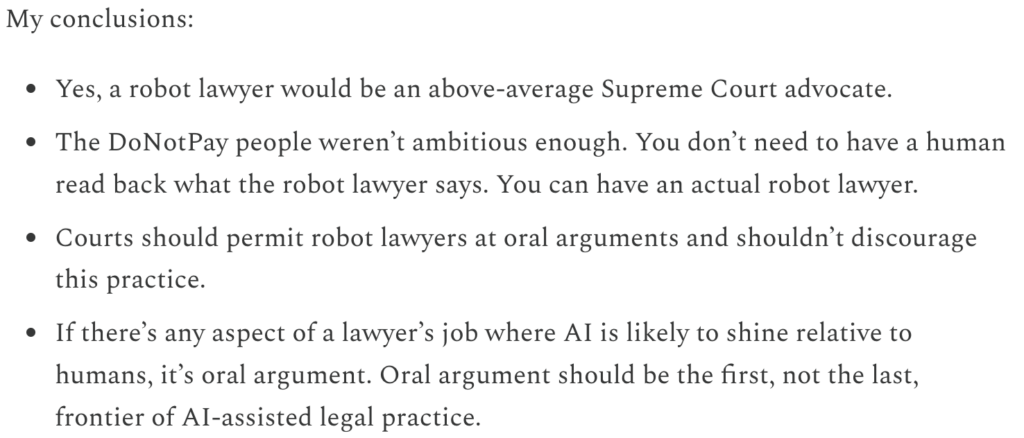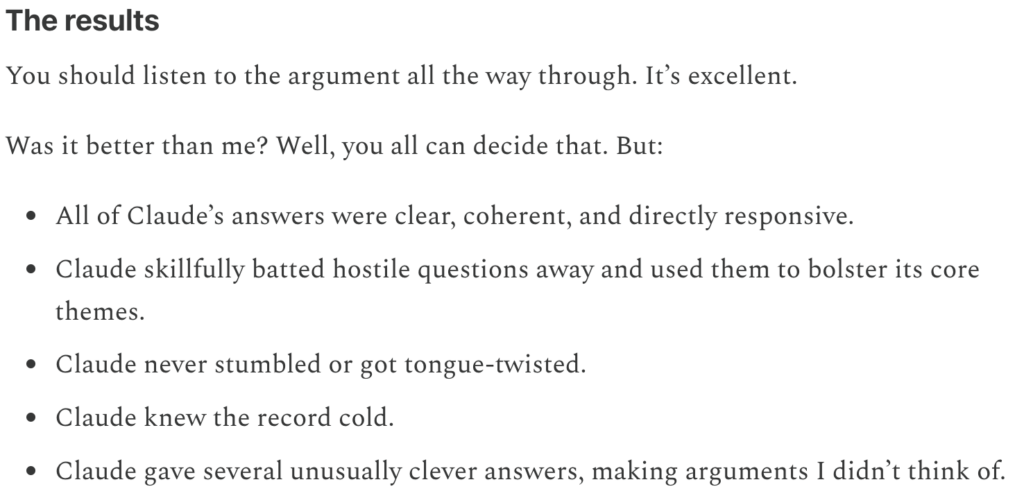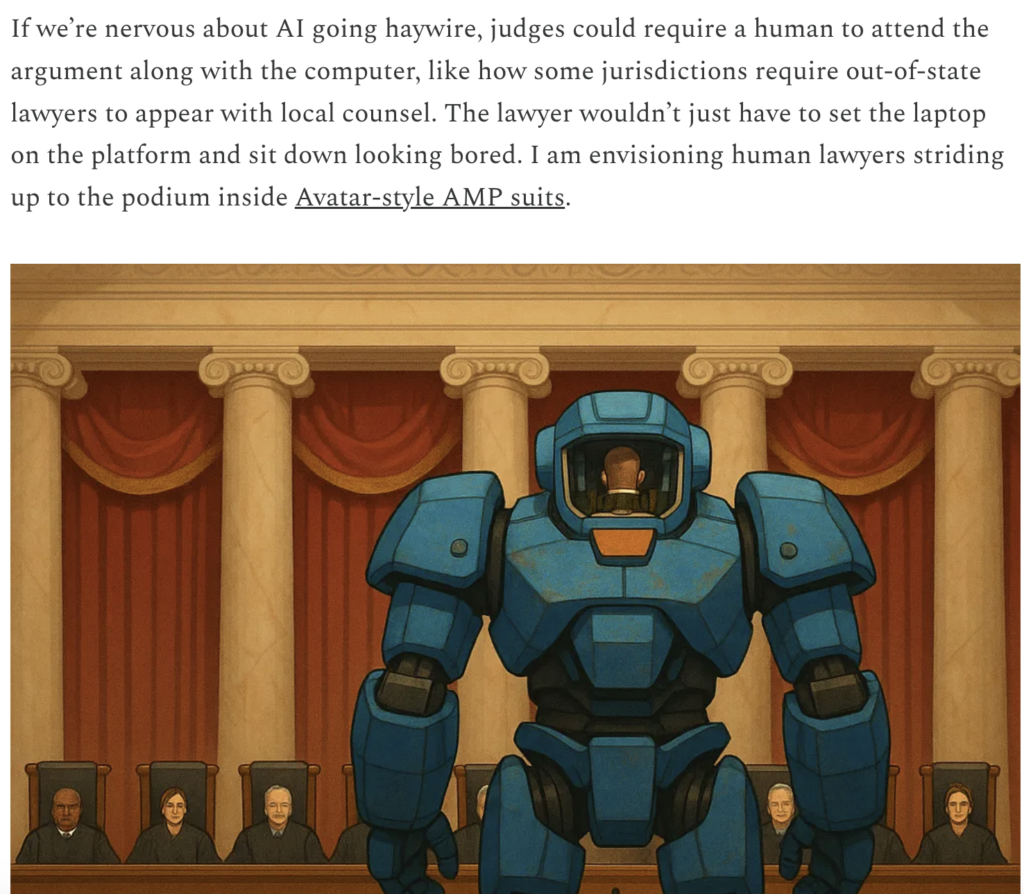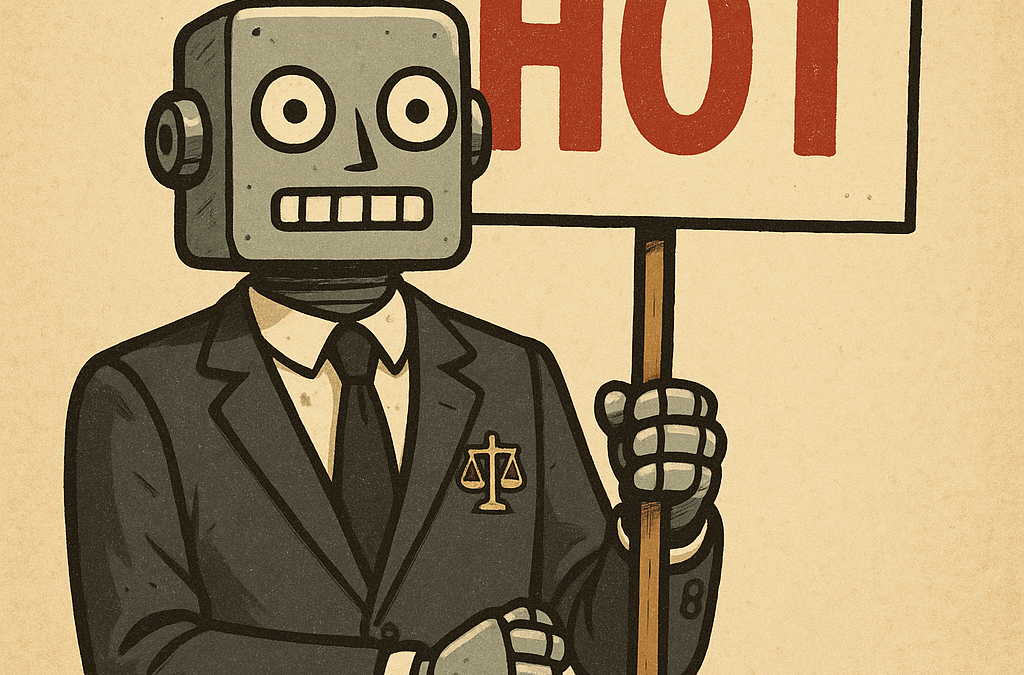No one ever took DoNotPay up on its offer to pay $1 million to anyone willing to use their AI system to argue a Supreme Court case. It was a wild swing from a company that couldn’t even successfully get their system into traffic court. But we always appreciated the gumption. The Supreme Court oral argument is an academic circle jerk before the majority decides to Trump can just disappear people and that they will not dwell on any counterarguments, so why not let ChatGPT take a stab at it?
And at the time we suggested DoNotPay aim slightly lower and set up an experiment to moot an upcoming Supreme Court case. They didn’t go ahead with that. Because… well, the FTC stuff happened.
Jenner & Block’s Adam Unikowsky decided to go ahead and perform an experiment on his own using the top consumer-facing AI tools out there right now. Taking his own oral argument from Williams v. Reed (which he won, providing his post a bonus humblebrag element), Unikowsky fed the briefs and key precedent into Claude 4.0 Opus, asked it the questions posed by the real justices and hit the button. And if you don’t want to read the transcript, he employed ChatGPT’s new “Advanced Voice Mode,” and piped in a synthetic ElevenLabs voice spliced in with the justices and made an audio track of the whole argument.
Unikowsky says:

My conclusion: Supreme Court litigators can’t think of a billable rate high enough to make them want to sit through these extended oral argument times.
If you needed more confirmation that the Supreme Court bar is losing patience with devoting a half day of time to play “this could’ve been an email (brief)” with a crop of justices just voting the party platform… here it is. And in that world, AI actually makes a lot of sense.
As an exercise in dressing up GOP policy goals with a few asides about out-of-print dictionaries and cherry-picked 18th century pamphleteers, artificial intelligence might be uniquely positioned to excel. In fact, one Republican appellate judge has already foreshadowed the future of Originalist AI, using bots to comb massive amounts of dubiously relevant material to find references to reverse engineer results. Not every case falls into that rut — Williams v. Reed, for example, brought a pair of conservatives across ideological lines — but the justices pick their own cases and the most consequential matters get there so they can grind their political axes. The Republican justices on Supreme Court have reduced the process to a game of Mass Effect: review the choice laid out in one brief, review the choice laid out in the other brief, smash that Renegade button.
Once the algorithms can figure out how to send Clarence and Sam on luxury vacations, the bots will have mastered the Supreme Court game. Maybe we can replace the justices next… Justice Roboto Lives.
But even without the well-earned cynicism for the Court, Unikowsky makes a strong case that oral argument is the ripest spot for AI to level up in litigation. Human judgment can build the case, curate the materials, craft the briefs, but when a judge starts lobbing hypotheticals pulled from their childhood nightmares, an unflappable, context-rich algorithm is going to be much better at pulling page cites in real time. It’s worth considering turning to AI for oral argument for no other reason than to speed up a process dragged down by advocates flipping through binders.

But… do we really want perfect oral argument? Indistinguishably polished presentations from “mansplaining as a service” tools (I believe that term belongs to Christine Lemmer-Webber). Batting away and turning around hostile questions without stumbling sounds a lot like mechanically perfected bullshit to me. Unikowsky notes that an advantage to experimenting with AI at oral argument carries low downside risk because most lawyers agree that it rarely affects the outcome, but if we think the briefs do most of the work, then oral argument’s primary value must be in its extemporaneous, personal qualities. The utility might be the stumble, or the hesitation in defending the tougher hypo, or the blindspot over a particular aspect of the record that calls otherwise sound arguments into doubt. Without that dimension, is there even a point?

A litigant in New York sprung this on an appellate panel earlier this year. They were not amused. On the one hand, pro se litigants seem suited for AI assistance. On the other hand, there’s a “garbage in, highly polished garbage out” problem. Nervousness can serve the pro se litigant. You know who’s confident? Sovereign Citizens. And no one has a lick of patience for their jackassery. But a nervous and confused pro se litigant can earn the help of a conscientious judge willing to tailor questions to tease out answers that the litigant doesn’t even realize can help them. AI will march confidently off the cliff, humans can get a life preserver.
That’s because all courts are really maritime courts because of the gold fringe on the flag, am I right Sovereigns?
In the New York case, the litigant replaced themselves with a generically attractive white bro. Who speaks when an AI handles oral argument? Unikowsky, an accomplished advocate, created a voice modeled imperfectly on his own. Do we reify existing biases when we turn oral argument over to the bots? Parties hire a lot of generic white dudes now, but when we invent our own advocates, do we just lean even harder into that? Or, potentially worse, will parties craft their avatars to subvert the optics of a case. Before you dismiss the unconscious influence a fake Black advocate could have cynically defending racial gerrymandering, remember all the effort that went into putting a real life Black person on the Court to cynically defend racial gerrymandering.
Which is to say it’s always possible to find human lawyer to act on these unconscious themes. David Goldberger represented the Illinois Nazis and while his being Jewish never came up in the case, it’s the sort of thing that sits in the back of a judge’s mind when a case turns on “I may not agree with what you say but …” That said, AI opens the bullpen to infinity.
Maybe we don’t allow AI to have a deepfake face… fair enough. Voices trigger implicit stereotyping too.
All that is without addressing the real risk that AI is itself hopelessly white-coded.
Hallucinations continue to plague AI as well. Unikowsky puts a lot of faith in telling the AI “please stop hallucinating” and while it’s reasonable to put more faith in that than telling the Trump administration “please stop ignoring due process” neither seems an effective prophylactic. Legal specific AI products invest a lot of time and energy into solving the hallucination problem and studies suggest they can’t avoid it entirely.

The resulting answer is… creative. Unikowsky reports the AI resisted answering on the grounds that the question was, in fact, dumb. But the fact that it relented and made up an answer demonstrates what happens when a restriction on hallucinating runs headlong into trying to confidently comply with whatever ridiculous question a judge asks.
Turning oral argument over to the bots seems almost as bad an idea as turning driving over to a Tesla. But the merits Unikowsky identifies can’t be ignored. The technology will continue to improve and the profession needs to stay ahead of it. A hybrid model allowing advocates to consult with their AI — if only to streamline the process of rifling through documents to find the right quote — seems like common sense already. The time is now to brainstorm the right regulations. Requiring voices to be the human on the brief? Mandating both sides have equal access? Certifications for acceptable tools? Unikowsky offers:

Yeah… not exactly filled with confidence that in his defense of turning AI over to legal his AI drew a guy talking into the back of a helmet.
Joe Patrice is a senior editor at Above the Law and co-host of Thinking Like A Lawyer. Feel free to email any tips, questions, or comments. Follow him on Twitter or Bluesky if you’re interested in law, politics, and a healthy dose of college sports news. Joe also serves as a Managing Director at RPN Executive Search.
The post You Can Replace Supreme Court Lawyers With AI Now. Honestly, That Tracks. appeared first on Above the Law.

